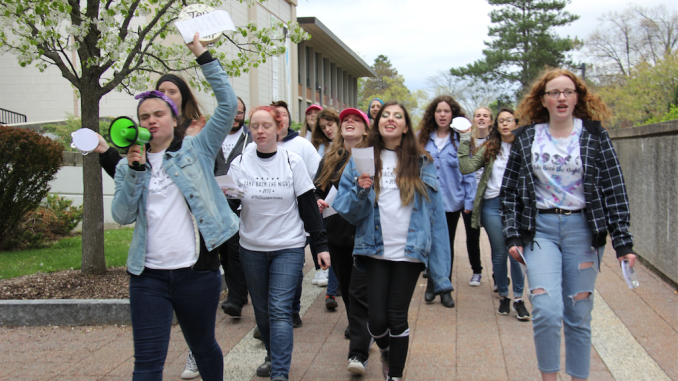
A community of survivors and allies took over Old Main Quad to create a safe space for all who entered.
Under a large white tent, the organizers of the 25th annual Take Back the Night event were busy holding workshops, creating self-care kits and presenting speakers on Saturday, April 27, to ignite the afternoon.
Take Back the Night (TBTN) is an international event to protest against sexual violence, especially violence against women. Since their conception 60 years ago, their mission has been to create safe communities through their events and initiatives by spreading awareness and opening up conversation. They hope to end sexual assault and abuse, domestic and dating violence and all other forms of sexual violence.
According to their official website, “TBTN Events began in the 1960s in Belgium and England with protests about women not being safe walking down the street alone. In 1973 in the United States, women at the University of South Florida dressed in black sheets holding broomsticks and marched through campus demanding a women’s center. In 1975, a crowd in Philadelphia held a TBTN event to protest the murder of a microbiologist walking near her home after work.”
“It’s important we hold these kinds of events to stimulate difficult conversations around rape and sexual assault. I learned so much from attending TBTN that I wouldn’t have known otherwise,” said third-year psychology major Emmalyn Knapp. “It’s not just an event for women, but it’s an event for all people regardless of gender, sexuality, race or any type of identity. We can’t fix the problem if we don’t talk about it.”
The team, donning their classic white TBTN T-shirts, was spearheaded by President Tara Manning and together they made a space for people to discuss their experiences and find comfort in the support of other survivors.
“I know some people who run TBTN. I participated over 10 years ago when I was in undergraduate school, and it’s an important ‘cause that needs more people to know about it,” said alum Andrew Vlad, assistant director of the New Paltz Youth Program. “It’s important to raise awareness. There’s a good point to be made, however, that eventually we shouldn’t need to have these events because women should be respected and word should be out about it.”
Throughout the four hours, TBTN held a wide range of workshops about consent, trust and coping strategies. They also had Joel Oppenheimer of the Psychological Counseling Center (PCC), Anique Nicholson from the Mid-Hudson Planned Parenthood and English professor Dr. Mary Holland shared with the group how to hold assailants accountable, what resources are available to survivors and personal anecdotes to further exemplify the affinity and strength that’s at the heart of TBTN.
Some of the events held at this TBTN event were rock-painting, tie-dyeing shirts and creating your own self-care kit equipped with kinetic sand, journals, hand sanitizers and other small necessities. They also had home-made zines paired with the event for people to take home.
“For the time being, it’s important to keep doing these events,” Vlad said. “Whether you’re an alum or a student here, you should come to them.”
Certain clubs and organizations tabled at the event to provided resources and comfort to those who may have been affected or triggered by the sensitive topics. OASIS/HAVEN, Planned Parenthood of the Mid-Hudson Valley, Circle K International, Feminist Collective, African Women’s Alliance, Omega Phi Beta Sorority, Project Heal and the National Residence Hall Honorary all tabled at the event.
At the end of the event, Manning sparked a rally and the group marched across campus in protest to further take back the night and the campus. Manning announced shocking statistics of sexual violence that spurred the event-goers into action.
“TBTN is important because it provides a platform and space for survivors to be in charge of their own healing,” Manning said.

